
December 30
1884 Birth: Hideki Tojo:
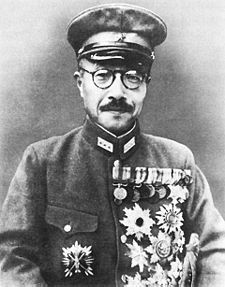
On this day, Hideki Tojo, prime minister of Japan during the war, is born in Tokyo.
After graduating from the Imperial Military Academy and the Military Staff College, Tojo was sent to Berlin as Japan's military attache after World War I. Having already earned a reputation for sternness and discipline, Tojo was given command of the 1st Infantry Regiment upon return to Japan. In 1937, he was made chief of staff of the Kwantung Army in Manchuria, China. Returning again to his homeland, Tojo assumed the office of vice-minister of war and quickly took the lead in the military's increasing control of Japanese foreign policy, advocating the signing of the Tripartite Pact with Germany and Italy in 1940 that made Japan an "Axis" power. In July of 1940, he was made minister of war and soon clashed with the Prime Minister, Prince Fumimaro Konoye, who had been fighting to reform his government by demilitarizing its politics. In October, Konoye resigned because of increasing tension with Tojo, who succeeded as prime minister while holding on to his offices of army minister and war minister, and assuming the offices of minister of commerce and of industry as well.
Tojo, now a virtual dictator, quickly promised a "New Order in Asia," and toward this end supported the bombing of Pearl Harbor despite the misgivings of several of his generals. Tojo's aggressive policies paid big dividends early on, with major territorial gains in Indochina and the South Pacific. But despite Tojo's increasing control over his own country, even assuming the position of the chief of the general staff, he could not control the determination of the United States, which began beating back the Japanese in the South Pacific. When Saipan fell to the U.S. Marines and Army, Tojo's government collapsed. Upon Japan's surrender, Tojo tried to commit suicide by shooting himself with an American .38 pistol but was saved by an American physician who gave him a transfusion of American blood. He lived only to be convicted of war crimes by an international tribunal—and was hanged on December 22, 1948.
Asao Uchida portrayed him in the 1970 film Tora! Tora! Tora!. (History.com)
1911 China: Sun Yat-sen was elected the first president of the Republic of China.
1915 World War I: War at sea: While the passengers are having lunch, the British P & O liner Persia is torpedoed by U-38, commanded by ace Max Valentiner. The Persia sinks in five to ten minutes, killing 343 of the 519 aboard. The sinking is highly controversial, since it breaks naval international law, or the "Cruiser Rules", that state that merchant shipping carrying passengers should be given opportunity for the passengers to disembark before combat can commence. A warning shot across the bow should have been given first. Instead, the U-Boat fires a torpedo with no warning.
1916 Hungary: Emperor Charles I of Austria and Empress Zita were crowned as the last King and Queen of Hungary.
1918 Weimar: Communists: Karl Liebknecht and Rosa Luxemburg change the name of the Spartacus League to the Communist Party of Germany (KPD). (THP)
1922 USSR established:

In post-revolutionary Russia, the Union of Soviet Socialist Republics (USSR) is established, comprising a confederation of Russia, Belorussia, Ukraine, and the Transcaucasian Federation (divided in 1936 into the Georgian, Azerbaijan, and Armenian republics). Also known as the Soviet Union, the new communist state was the successor to the Russian Empire and the first country in the world to be based on Marxist socialism.
During the Russian Revolution of 1917 and subsequent three-year Russian Civil War, the Bolshevik Party under Vladimir Lenin dominated the soviet forces, a coalition of workers' and soldiers' committees that called for the establishment of a socialist state in the former Russian Empire. In the USSR, all levels of government were controlled by the Communist Party, and the party's politburo, with its increasingly powerful general secretary, effectively ruled the country. Soviet industry was owned and managed by the state, and agricultural land was divided into state-run collective farms.
In the decades after it was established, the Russian-dominated Soviet Union grew into one of the world's most powerful and influential states and eventually encompassed 15 republics--Russia, Ukraine, Georgia, Belorussia, Uzbekistan, Armenia, Azerbaijan, Kazakhstan, Kyrgyzstan, Moldova, Turkmenistan, Tajikistan, Latvia, Lithuania, and Estonia. In 1991, the Soviet Union was dissolved following the collapse of its communist government. (History.com)
1932 The Soviet Union institutes welfare reform and bars food handouts for housewives under 36 years of age. They must now work to eat.
1936 Antisemitism: Poland: A Jesuit periodical asserts that it is necessary "to provide separate schools for Jews, so that our children will not be infected with their lower morality." (THP)
1937 Various:

Otto Rahn: After four months service with the SS-Death's Head Division Oberbayern at Dachau, he is given leave to devote himself fully to writing, until his resignation from the SS in February 1939. (THP)
Volkishness: Otto Rahn's second book Luzifers Hofgesind: Eine Reise zu den guten Geistern Europas (Lucifer's Court in Europe) is published in Leipzig. (THP)
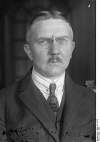
1938 Holocaust: Hjalmar Schacht meets in London with George Rublee, American lawyer and director of the intergovernmental committee. Schacht presents a plan to allow 150,000 German Jews to leave Germany over a three year period.
1939 Various:
From the minutes of a meeting between Hitler and Raeder:
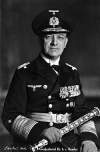
The Chief of the Naval Operations Staff requests that full power be given to the Naval Operations Staff in making any intensification suited to the situation and to the means of war. The Fuehrer agrees in principle to the sinking without warning of Greek ships in the American prohibited area and of neutral ships in those sections of the American prohibited area in which the fiction of mine danger can be upheld, e.g., the Bristol Channel.
Generated by the OKW, signed by Jodl:
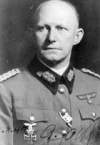
On the 30th of December 1939, according to a report of the Supreme Commander of the Navy, the Fuehrer and Supreme Commander of the Armed Forces decided that: I) Greek merchant ships in the area declared by England and the USA to be a barred zone are to be treated as enemy vessels. (Attack must be carried out without being seen. The denial of the sinking of these steamships, in case the expected protests are made, must be possible.) 2) In the Bristol Channel all shipping may be attacked without warning-where the impression of a mining incident can be created. Both measures are authorized to come into effect immediately.
Secret Diary of Anti-Hitler Conspirator Ulrich von Hassel:
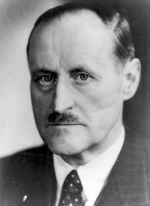
I arrived in Berlin on the 27th, an hour and a half late, and first of all went to look for Popitz. He judged the situation considerably more optimistically than the last time, because the terror regime of the SS in the East and the arrogance of these men towards the army were gradually opening the eyes of the soldiers to this disgrace to Germany and this brigand state within a state. In the West, too, he informed me, the SS had marched up behind the army to take Holland and Belgium into their possession, to the great bitterness of the army. It seems that Hitler had ordered that the executive power there should remain in the hands of the army, not as in Poland. But nobody has any faith in these statements any more, least of all in their permanence. Popitz described the situation more or less as follows: Among the top-ranking generals, Brauchitsch has been written off. The idea is now that a few divisions should be halted in Berlin "on the way from the West to the East". Then Witzleben should appear in Berlin and mop up the SS. There upon Beck should travel to Zossen and relieve Brauchitsch's weak hands of the High Command. Hitler should be certified medically unfit to govern and be locked up. Then an appeal to the nation, with a promise to prevent any further atrocities by the SS, to continue the war, but in readiness to accept a peace on a reasonable basis.
1941 World War II: Various:
World War II: Churchill speaks to the Canadian Parliament:

The Canadian Army now stationed in England has chafed not to find itself in contact with the enemy. But I am here to tell you that it has stood and still stands in the key position to strike at the invader should he land upon our shores. In a few months, when the invasion season returns, the Canadian Army may be engaged in one of the most frightful battles the world has ever seen, but on the other hand their presence may help to deter the enemy from attempting to fight such a battle on British soil. Although the long routine of training and preparation is undoubtedly trying to men who left prosperous farms and businesses, or other responsible civil work, inspired by an eager and ardent desire to fight the enemy.
Holocaust: Gas vans:

The former Chief of the Criminal Police in the city of Stuttgart, SS Major Christian Wirth, sets up operation in the village of Chelmno (Kulmhof), forty miles northwest of the Lodz ghetto. Working on behalf of the Gauleiter of Warthegau, who had recently obtained Himmler's permission to kill 100,000 Jews in his jurisdiction, Wirth installs several vans of the type the Einsatzgruppen had experimented with in Russia. They are rigged to direct carbon-monoxide fumes from the engine's exhaust into a large sealed cabin in the rear. The larger vans accommodate up to 150 people who are gassed on the way to burial grounds. Note: Wirth had conducted the first gassing experiments on the incurably insane in 1939 at the "euthanasia" institution at Brandenburg an der Havel in Prussia. (THP>)
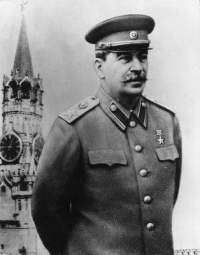
Stalin calls on the Orthodox Patriarch of Russia to bless the Red Army.
War with Japan: US forces are pulled back from Tarlac to their last prepared line before the Bataan Peninsula.
1942 World War II: Various:

FDR to Stalin: In the event that Japan should attack Russia in the Far East I am prepared to assist you in that theater with an American Air force of approximately one hundred four-engine bombardment airplanes as early as practicable.
Stalingrad: Stavka directive that the attack at Stalingrad is to take place on 6 January. Note: On 3 January, because of delays in deploying troops and moving up supplies, Rokossovsky and the Stavka representative with the Don and Voronezh Fronts, Nikolai Voronov, ask for postponement. Stalin grudgingly allows them four days.
1944 World War II: Various:
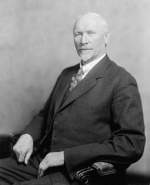
Smuts to Churchill and Eden:
So that the world will see that Britain, as friend and ally, had no choice, a factual exposure should now be made of the bitter suffering inflicted on the Greek people, the dynamiting of property, the ruthless destruction and extortion, the rounding up and execution of innocent hostages, the coercion of the civilian population by terrorist methods in true Nazi style. Following immediately on your courageous mission, a full and accurate statement of facts may lead to a wholesome reversal of public opinion.
FDR to Stalin:
I am disturbed and deeply disappointed over your message . . . . in regard to Poland . . . . I would have thought no serious inconvenience would have been caused your Government or your armies if you could have delayed the purely juridical act of recognition for the short period of a month remaining before we meet . . . . I see no prospect of this Government's following suit and transferring its recognition from the Government in London to the Lublin Committee in its present form . . . . The fact is that neither the Government nor the people of the United States have as yet seen any evidence either arising from the manner of its creation or from subsequent developments to justify the conclusion that the Lublin Committee as at present constituted represents the people of Poland . . . . I am more than ever convinced that when the three of us get together we can reach a solution of the Polish problem, and I therefore still hope that you can hold in abeyance until then the formal recognition of the Lublin Committee as a Government of Poland. I cannot from a military angle see any great objection to a delay of a month.
France: The VIII Corps from Patton's Third Army begins a new attack northward in the direction of Houffalize.
1947 Romania: King Michael is forced to abdicate by the country's communist government. [For further information, click here]
1950 Cold War: Acheson calls for renewed effort to meet communist threat:
In a fiery statement, Secretary of State Dean Acheson declares that the United States will increase its efforts to contain communist aggression and calls upon the American people for support and sacrifice.
The statement was issued just weeks after hundreds of thousands of communist Chinese troops entered the Korean War, threatening to expand the conflict into a third world war. Acheson noted that 1950 had been a "dark year," but also argued that the United States had made great advances in thwarting communist machinations around the world. Nevertheless, he continued, the United States faced a situation of "extreme gravity." "Our freedom, our way of life, is menaced," Acheson declared. In some of the harshest language in the statement, the secretary argued, "The present difficulties arise from the lawless and cynical conduct of the communists who would destroy peace and freedom." Despite talk of peace from the Soviet Union, said Acheson, its recent actions revealed its talk to be "nothing but camouflage to cloak the naked imperialism of its aims." The United States and the American people needed to support all efforts to defeat the communist threat. "No sacrifices are too great when the future of this nation is at stake."
Acheson's heated rhetoric might have been an attempt to make up for his handling of foreign policy during the previous two years, when the secretary fell under near-constant criticism for not taking a tough stand against communism. Attacks by Senator Joseph McCarthy had been particularly loud and damaging. As 1950 drew to a close Acheson took a hard-line, declaring that the United States was willing and able to meet any challenge posed by the communists and that American commitment to Korea would not falter. (History.com)
2006 Death: Saddam Hussein—who modeled himself on Hitler—down to the moustache:
Those who don't learn from history are doomed to repeat it." The lives of Saddam Hussein and Adolf Hitler are tragic not only because of the devastation that these two men caused, but also because it could have been so easily prevented had they both reflected upon the past, seen what they were headed for, and made different choices. Although they ruled in two different time periods and different countries (Hitler: Germany, 1933-1945; Hussein: Iraq, 1980-2003), there are striking similarities between these two men and the way they ran their countries into ruin.
Edited by Levi Bookin (Copy editor)
levi.bookin@gmail.com
FAIR USE NOTICE: This site may contain copyrighted material the use of which has not always been specifically authorized by the copyright owner. We are making such material available in our efforts to advance understanding of historical, political, human rights, economic, democracy, scientific, environmental, and social justice issues, etc. We believe this constitutes a 'fair use' of any such copyrighted material as provided for in section 107 of the US Copyright Law. In accordance with Title 17 U.S.C. Section 107, the material on this site is distributed without profit to those who have expressed a prior interest in receiving the included information for research and educational purposes. If you wish to use copyrighted material from this site for purposes of your own that go beyond 'fair use', you must obtain permission from the copyright owner.
Please note that the list-owner and the moderators are not responsible for, and do not necessarily approve of, the random ads placed on our pages by our web server. They are, unfortunately, the price one pays for a 'free' website.